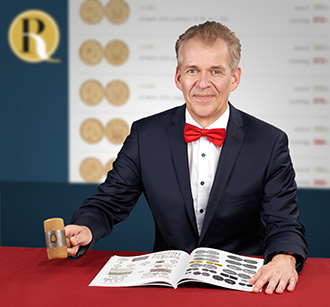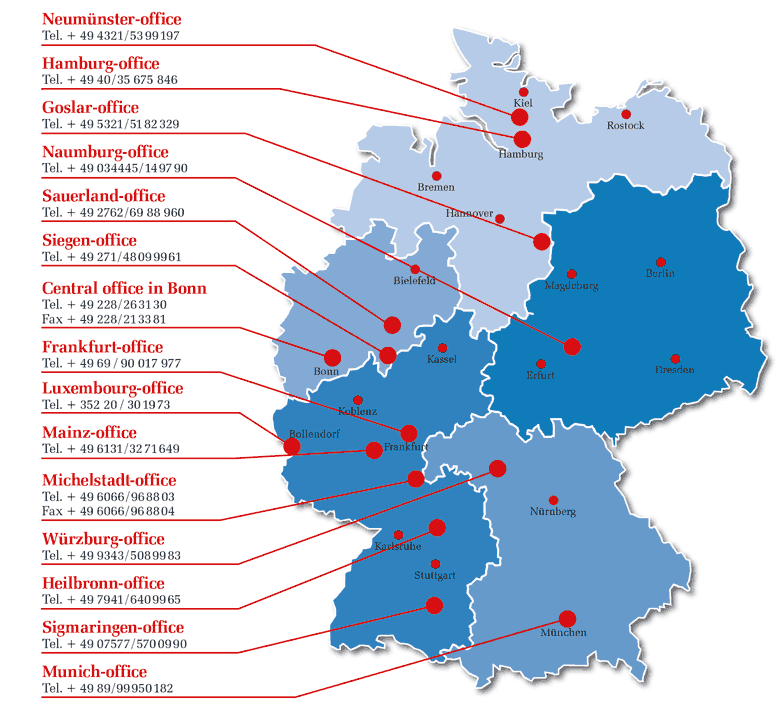Sale of your banknote or bill collection
You want to sell part or all of your banknote collection?
We offer two ways to do that: By auctioning them through our large-scale international auctions, or by outright cash purchase.
Please contact us via e-mail or phone (0228/263 130, for additional phone numbers please look below) and give us a brief description of what you want to consign.
We give you our expert advice and determine the expected proceeds of your goods with you. That can usually take place at your preferred location. The moment the consignment is handed over to us, it is insured against every imaginable risk.
Auction
The ideal way: Your consignment is professionally processed and divided into auction lots in order to obtain the best price. This can be arranged according to your wishes and your approval.
The merchandise will then be presented in our catalogues to an international audience. Our large and affluent clientele ensures the optimum proceeds. You benefit from all bid increases in the bidding battles, for you only pay an appropriate commission on the proceeds.
Outright cash purchase
At your request we are also happy to make you a cash offer.
The advantages: You receive the payment right away, there is no waiting for the auction results and the accounting to be finished, and furthermore the proceeds are independent of the situation in the auction room. On the other hand, the proceeds from an outright sale are in general considerably lower than the proceeds that can be realized through an auction.
Information video
Our information video illustrates in vivid detail the procedure of the consignment and the course of action during an auction.
Zentrale in Bonn
Phone: 0228/263 130
Office hours:
Mo.-Fr. 9 am — 5 pm
E-Mail
muenzenankauf@rhenumis.de
+49 176 21347187
Dr. Reinhard Fischer
Auctioneer and company owner
What is the value of my banknotes / bank bills?
You have inherited bank bills or banknotes and have no idea what these pieces are worth?
What many people do not know: The found paper money from the attic or even the inherited Reichsmarkscheine from grandparents can fetch amazing prices!
We help you with some rules of thumb:
The most meaningful question is usually about the former owner. If he invested a lot of money in his collection, the collection is usually worth something, if only small amounts were spent, the value is also only small.
Little worth are normally: Banknotes with high circulation, damaged, broken or torn banknotes, fun and fantasy banknotes.
What is the difference between bills and banknotes?
Bills are means of payment made of paper or a comparable material. Banknotes are bills that are issued by a bank, e.g. Deutsche Bundesbank.
What is emergency money?
Emergency money is a money substitute resulting from a deficiency situation, which replaces missing legal tender and is issued by states, municipalities or private companies. Emergency money can also include the use of goods and food (e.g. bread stamps).
How valuable are my banknotes or bills?
Unfortunately, it is not possible to make a blanket statement about the value of banknotes or bank bills. Whether old or new, former or modern banknotes or bills are valuable cannot be answered so easily. The value can usually be determined according to the principle of supply and demand. In the collecting area and also on the sales market, several factors are responsible for the final value of the respective piece of banknotes and bills. The rarity or desirability of a banknote or bill can often provide information about its actual market value. In addition to the nominal value, the banknote or bill can also have a collector's value, which in many cases exceeds the nominal value.
The condition plays a decisive role here. The condition is usually divided into 4 degrees of preservation (according to the Rosenberg catalog):
- Condition I (fresh from the till): without any signs of use, clean paper, no creases, folds, pinholes or tears.
- Condition II (slightly used): clean paper, small vertical or horizontal creases.
- Condition III (used): signs of use, dirt, creases, slight wrinkles.
- Condition IV (heavily used): clear signs of use, heavy creasing, heavy soiling, tears or missing corners.
Condition V-VII can be neglected here, since pieces in these conditions are usually not offered on the market or are only rarely for sale.
The condition of a banknote or bill is decisive for its value and can often multiply the value of one and the same piece from condition III to condition I. The condition should be evaluated strictly and objectively.
Often also the completeness of a collection, e.g. if all banknotes of a series are present, can increase the sales value.
In addition, misprints, unusual or consecutive serial numbers, as well as other unique selling propositions can usually cause significant increases in value.
High-quality banknotes are nowadays usually sold with a certificate or a receipt from an expert. If you see such certificates in a collection, this is an indication that the collection could be valuable. The absence of such certificates does not necessarily mean anything, because in earlier years certificates were rarely issued and many collections have been in existence for a long time.
The same applies if you find invoices or lottery tickets from auction houses in the collections.
A review of the collection or the bank bill is therefore immensely important and should be done in any case.
Dealing with banknotes and bills!
Cautious handling is extremely important to avoid unnecessarily reducing the value of the banknotes found, inherited or even collected by the customer. Especially with the classic "attic find" of old objects, you should first of all check the condition in which they are found. Old banknotes, which may have been exposed to a damp environment, are often prone to cracking and can be damaged if handled with care. Avoid treating these banknotes like everyday euro bills or touching them with dirty fingers.
When handling them, you should also avoid making kinks, which are usually a significant depreciation in value. It is advisable to take the pieces carefully by the edge for examination instead of roughly grabbing them with your fingers. If the banknotes are already in an album, they should ideally not be taken out at all.
However, please avoid the following errors to minimize the risk of loss of value.
- Never sort the old banknotes.
- Do not take the banknotes out of the album with your bare fingers.
- Do not bend them.
- Store albums dry and away from light.
How can you increase the value of the banknotes?
Although a good conservation of value can be achieved by avoiding the enumerated errors, an increase of this value is hardly realizable. Especially old pieces like inflation money or emergency money from the 1920s suffer from attempts to remove existing errors: While the paper is too sensitive to remove dirt, ironing out creases damages the colors of the bill. You should also avoid "removing" tears using adhesive tape, because the banknotes in question then usually look worse than before and are also worth less. The most effective way to increase value is therefore to prevent depreciation.
Our offices

Zentrale in Bonn
phone: 0228/263 130
Headquarters in Düsseldorf: phone +49 (0)211/550 440,
fax +49 (0)211/550 4411
Headquarters in Bonn: phone +49 (0)228/263 130,
fax +49 (0)228/213 381
Frankfurt-office: phone +49 (0)69/900 179 77
Goslar-office: phone +49 (0)5321/518 23 29
Hamburg-office: phone +49 (0)40/356 758 46
Heilbronn-office: phone +49 (0)7941/640 99 65
Luxembourg-office: phone +352 20/301973
Mainz-office: phone +49 (0)6131/327 16 49
Michelstadt-office: phone +49 (0)6066/968 803,
fax +49 (0)6066/968 804
Neumünster-office: phone +49 (0)4321/539 91 97
(region Hamburg / Kiel)
Sauerland-office: phone +49 (0)2762/698 89 60
Siegen-office: phone +49 (0)271/480 999 61
Munich-office: phone +49 (0)89/999 501 82
Würzburg-office: phone +49 (0)9343/508 99 83
E-Mail: info@rhenumis.de
